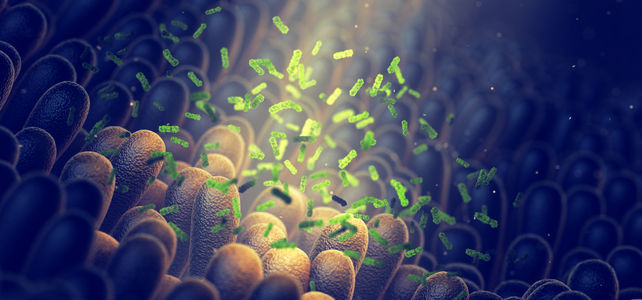For the first time, researchers have been able to demonstrate that a low-calorie diet leads to the multiplication of certain bacteria – in particular, Clostridium difficile, which is known as hospital germs.
How does a drastically reduced calorie diet affect the gut flora
Researchers at Charité Universitätsmedizin Berlin and the University of California at San Francisco have been able for the first time to demonstrate that a low-calorie diet can profoundly alter the composition of microorganisms in the human gut. As they now describe in Nature, the diet leads to the multiplication of certain bacteria — particularly Clostridium difficile, otherwise known as hospital germs. These bacteria can affect food intake in the intestine and thus the human energy balance.
Trillions of gastrointestinal microorganisms, also known as the microbiome or gut microbiota, vary from person to person. People who are overweight and obese have a different microbiome than people of normal weight. Many people try to lose weight through diet during their lifetime. But what exactly does such a drastic change in diet do to the body? An international research team coordinated by Charité investigated this question. “We have been able to show for the first time how a very low-calorie diet profoundly alters the composition of the gut microbiota, thus having a lasting effect on the energy balance of the human host,” says Professor D. Joachim Spranger, director of the medical clinic for endocrinology and metabolism at the Charité, is one of the study’s lead authors.
Gut bacteria change the way food is absorbed in the gut
The team examined the effects of dieting on 80 slightly overweight to largely overweight women, who either lost weight with so-called dieting — with the help of ready-made drinks at less than 800 calories per day — under medical supervision or maintained their weight over a period of time. 16 weeks. Test subjects were accompanied at the Center for Experimental and Clinical Research (ECRC), a joint facility between Charité and the Max Delbrück Center for Molecular Medicine at the Helmholtz Society (MDC). Regular analysis of feces showed that the diet reduces the number of microorganisms in the intestines of women and changes the composition of the intestinal flora.
“We were able to observe how bacteria alter their metabolism in order to take in more sugar compounds that are then no longer available to humans. You could say that the hungry microbiome is evolving,” describes Dr. Reiner Jumpertz von Schwartzenberg, scientist and physician at the Medical Clinic of Endocrinology and Metabolic Medicine at Charité.
The scientists then transferred the stool samples they collected before and after the diet to the mice, which remained germ-free and therefore did not have their own intestinal flora. It was found that animals whose faeces were removed after the diet lost weight – more than 10 percent of their body mass in just two days. Such a fecal transplant before the diet had no effect. “Our results show that this phenomenon can be explained mainly by a change in the absorption of food in the intestines of the animals,” says Professor Springer. This confirms that the intestinal microflora has a significant impact on the absorption of food.
Hospital germs prevent food from being eaten through the intestinal wall
When the researchers examined the composition of the stool more closely, they noticed increased colonization by certain bacteria: Clostridioides. Microorganisms can be found in the environment as well as in the intestines of healthy people and animals. However, it can multiply significantly after antibiotic treatment and then cause severe inflammation of the intestinal wall. Clostridioides is also one of the most common problem germs in hospitals.
Both the test subjects who followed the diet and the mice that were transplanted with the corresponding human intestinal bacteria after following the diet had increased levels of it. “We were also able to show that Clostridium difficile produces toxins typical of bacteria – even weight loss for animals depends on it,” says Professor Spranger. “However, neither the test subjects nor the animals showed clinical signs of gastroenteritis.”
Professor Springer summarizes: “A low-calorie diet ensures that bacteria known as hospital germs can multiply more easily and make food absorption through the intestinal wall less efficient – but without causing symptoms of disease.” “So far it is not clear to what extent asymptomatic colonization with Clostridium difficile could harm health or possibly even promote health if the bacteria did not spread much. This must now be investigated in larger studies.” Study results could reveal possible treatment options for metabolic diseases such as obesity or diabetes. So the team is now looking into the question of how gut bacteria might be affected in order to produce beneficial effects on body weight and metabolism in humans.
those:
Reiner Jumpertz from Schwartzenberg et al.: Calorie restriction inactivates germs and resists colonization. nature. June 23, 2021.








More Stories
Coral Seeding: Artificial Insemination Makes Coral More Heat Tolerant
Fear, Anger, and Denial: How People Respond to Climate Change – Research
LKH Graz: Using radiation to combat heart arrhythmias